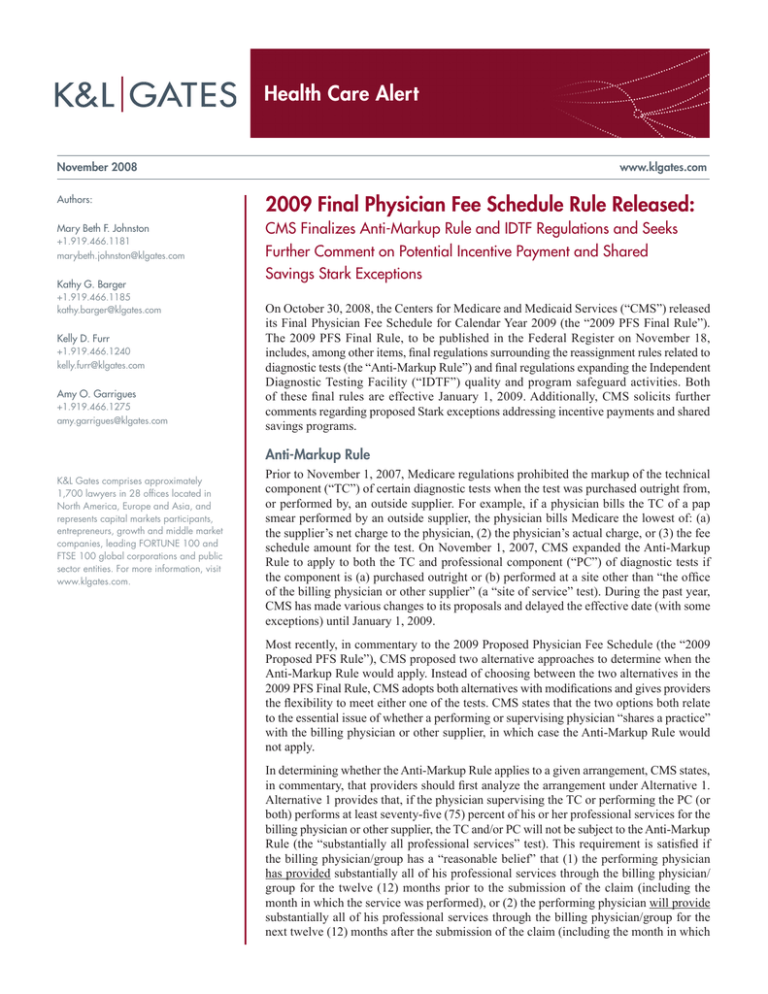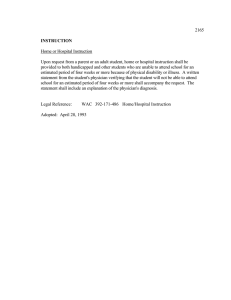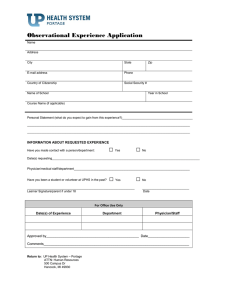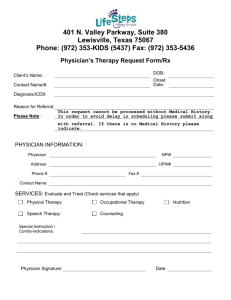
Health Care Alert
November 2008
www.klgates.com
Authors:
2009 Final Physician Fee Schedule Rule Released:
Mary Beth F. Johnston
CMS Finalizes Anti-Markup Rule and IDTF Regulations and Seeks
Further Comment on Potential Incentive Payment and Shared
Savings Stark Exceptions
+1.919.466.1181
marybeth.johnston@klgates.com
Kathy G. Barger +1.919.466.1185
kathy.barger@klgates.com
Kelly D. Furr
+1.919.466.1240
kelly.furr@klgates.com
Amy O. Garrigues
+1.919.466.1275
amy.garrigues@klgates.com
On October 30, 2008, the Centers for Medicare and Medicaid Services (“CMS”) released
its Final Physician Fee Schedule for Calendar Year 2009 (the “2009 PFS Final Rule”).
The 2009 PFS Final Rule, to be published in the Federal Register on November 18,
includes, among other items, final regulations surrounding the reassignment rules related to
diagnostic tests (the “Anti-Markup Rule”) and final regulations expanding the Independent
Diagnostic Testing Facility (“IDTF”) quality and program safeguard activities. Both
of these final rules are effective January 1, 2009. Additionally, CMS solicits further
comments regarding proposed Stark exceptions addressing incentive payments and shared
savings programs.
Anti-Markup Rule
K&L Gates comprises approximately
1,700 lawyers in 28 offices located in
North America, Europe and Asia, and
represents capital markets participants,
entrepreneurs, growth and middle market
companies, leading FORTUNE 100 and
FTSE 100 global corporations and public
sector entities. For more information, visit
www.klgates.com.
Prior to November 1, 2007, Medicare regulations prohibited the markup of the technical
component (“TC”) of certain diagnostic tests when the test was purchased outright from,
or performed by, an outside supplier. For example, if a physician bills the TC of a pap
smear performed by an outside supplier, the physician bills Medicare the lowest of: (a)
the supplier’s net charge to the physician, (2) the physician’s actual charge, or (3) the fee
schedule amount for the test. On November 1, 2007, CMS expanded the Anti-Markup
Rule to apply to both the TC and professional component (“PC”) of diagnostic tests if
the component is (a) purchased outright or (b) performed at a site other than “the office
of the billing physician or other supplier” (a “site of service” test). During the past year,
CMS has made various changes to its proposals and delayed the effective date (with some
exceptions) until January 1, 2009.
Most recently, in commentary to the 2009 Proposed Physician Fee Schedule (the “2009
Proposed PFS Rule”), CMS proposed two alternative approaches to determine when the
Anti-Markup Rule would apply. Instead of choosing between the two alternatives in the
2009 PFS Final Rule, CMS adopts both alternatives with modifications and gives providers
the flexibility to meet either one of the tests. CMS states that the two options both relate
to the essential issue of whether a performing or supervising physician “shares a practice”
with the billing physician or other supplier, in which case the Anti-Markup Rule would
not apply.
In determining whether the Anti-Markup Rule applies to a given arrangement, CMS states,
in commentary, that providers should first analyze the arrangement under Alternative 1.
Alternative 1 provides that, if the physician supervising the TC or performing the PC (or
both) performs at least seventy-five (75) percent of his or her professional services for the
billing physician or other supplier, the TC and/or PC will not be subject to the Anti-Markup
Rule (the “substantially all professional services” test). This requirement is satisfied if
the billing physician/group has a “reasonable belief” that (1) the performing physician
has provided substantially all of his professional services through the billing physician/
group for the twelve (12) months prior to the submission of the claim (including the
month in which the service was performed), or (2) the performing physician will provide
substantially all of his professional services through the billing physician/group for the
next twelve (12) months after the submission of the claim (including the month in which
Health Care Alert
the service was performed). In other words, either a
historical or future measurement can be used for the
twelve (12) months, but the month in which the service
was performed must be included.
The “substantially all professional services” test marks
an expansion from the proposal for Alternative 1 in the
2009 Proposed PFS Rule, which would have required
that the physician work exclusively for one physician
practice to qualify.
If, however, the performing physician cannot meet
the “substantially all professional services” test, the
arrangement can avoid the Anti-Markup Rule by
complying with Alternative 2. Under Alternative 2,
the performing physician must be an owner, employee,
or independent contractor of the billing physician or
other supplier and the TC or PC must be performed in
the “office of the billing physician or other supplier”
(the “site of service” test). The “office of the billing
physician or other supplier” is any medical office space
in which the ordering physician/supplier regularly
furnishes patient care and includes space where
the billing physician/supplier furnishes diagnostic
testing services if the space is in the same building.
For a physician organization, this space is where the
ordering physician provides substantially the full range
of patient care services that the ordering physician
provides generally.
In the 2009 Proposed PFS Rule, CMS had also solicited
comments on how to calculate the “net charge” for
purposes of applying the Anti-Markup Rule. Many
commentators expressed concerns that if overhead
costs were excluded from the “net charge,” the result
would be a detrimental financial impact on suppliers’
practices and, consequently on patient care. In the 2009
Final PFS Rule, CMS declines to revise the definition
of “net charge” and also declines to finalize a definition
of “outside supplier.”
IDTFs
Final Rule Defers Requiring Physician
Organizations Enroll as IDTFs
In the 2009 Proposed PFS Rule, CMS expressed
concern that certain physician entities provide
diagnostic testing services and bill for the services
without the benefit of qualified nonphysician personnel
and without meeting the performance standards that
IDTFs are required to meet. Due to this concern, CMS
proposed that physician or non-physician provider
organizations furnishing diagnostic testing services,
except mammography services, be enrolled as an IDTF
for each practice location furnishing these services and
be subject to most of the IDTF standards.
In the 2009 PFS Final Rule, CMS defers implementation
of this proposal while it continues to review public
comments and considers the impact of the enactment
of section 135 of the Medicare Improvements for
Patients and Providers Act of 2008 (“MIPPA”). MIPPA
requires the Secretary of Health and Human Services to
establish an accreditation process for entities furnishing
advanced diagnostic testing procedures, including
magnetic resonance imaging, computed tomography
and nuclear medicine. While this deferral will likely be
welcomed by many physician practices, the final rules
related to mobile IDTFs may impact physician groups
which currently bill for diagnostic services provided
by mobile entities, as described below.
Mobile Entity Enrollment and Billing
Requirements
In the 2009 Proposed PFS Rule, CMS proposed that
entities furnishing mobile diagnostic services enroll
and bill directly for the mobile diagnostic services
that they furnish, regardless of where the services
are furnished. The 2009 Final PFS Rule implements
this proposal, effective January 1, 2009, but allows
hospitals to continue to bill for diagnostic services
furnished under arrangement.
Interestingly, the final regulations do not specifically
state that mobile entities must enroll as an IDTF.
Rather, the regulations, included in the certification
standards at 42 CFR §410.33(g), require that an IDTF
enroll for all services it performs, regardless of the
location, and that it bill for all mobile diagnostic
services that are furnished to Medicare beneficiaries,
unless provided as hospital services under arrangement.
This peculiar placement might imply that a mobile
diagnostic provider is not required to enroll and bill
for diagnostic services if it provides services only at
physician, physician practice and/or hospital locations,
which otherwise may bill for diagnostic services under
their own provider numbers. However, the commentary
to the 2009 Final PFS Rule indicates that CMS intends
to apply the IDTF enrollment and billing requirements
more broadly to any mobile entity furnishing diagnostic
services. Without further clarification from CMS,
mobile entities providing diagnostic services should
enroll and bill for all services, except for those provided
under arrangement to hospitals.
November 2008 | 2
Health Care Alert
This requirement will impact physician practices that
contract with mobile entities to provide equipment
and personnel for the purpose of providing diagnostic
services. Currently, physician practices may bill for
such services. Under the new regulations, effective
January 1, 2009, CMS intends for mobile entities
leasing equipment and providing technicians who
conduct the diagnostic tests to enroll as an IDTF and
bill for the services. While not directly addressed by
CMS, it appears that a physician practice may continue
to bill for diagnostic services provided by its own
staff, even if the services are performed on mobile
equipment it leases.
Extension of Comment Period for Proposed
Exception for Incentive Payment and Shared
Savings Programs
In 2009 Proposed Physician Fee Schedule (the “2009
Proposed Rule”) issued in July, CMS proposed a
new lengthy, narrowly-tailored Stark exception for
incentive payment and shared savings programs. In the
2009 Final Rule, CMS re-opens the comment period
for ninety (90) days following the publication of the
final rule in the Federal Register, to obtain sufficient
information to create either one final exception for
incentive payment and shared savings programs, or,
alternatively, two exceptions – one for shared savings
programs and one for incentive payment programs.
In addition to soliciting comments in fifty-five (55)
particular areas, CMS encourages comments on any
and all relevant issues to an exception or exceptions.
Among the 55 specific queries, CMS seeks guidance
on (a) how to define “incentive payment program” and
“shared savings program” and whether this is the correct
terminology, (b) whether and how to address the issue
that some of these programs implicate the federal Civil
Monetary Penalty statute, 42 U.S.C. § 1320a-7a(b) and
the utility of an exception that incorporates conditions
from favorable Office of Inspector General (“OIG”)
advisory opinions, (c) whether independent medical
review or alternative measures to evaluate the impact
of a program on the quality of patient care is necessary,
and whether corrective action may be required in
certain circumstances, (d) what limitations should be
placed on physician qualifications for participating
in, and/or physician payments stemming from, such a
program, (e) how to allow sharing of cost savings and
whether baselines should be required to be adjusted, (f)
how to structure payments to take into effect increases
or diminutions in quality of care and how to measure
“quality,” (g) what safeguards should be required to
allow departmental or service line global cost savings,
(h) what documentation or audit requirements are
appropriate for hospitals in connection with this
exception, (i) whether contracts with only physicians
or also with physician groups should be protected,
and (j) whether existing exceptions can be modified
to protect certain arrangements and therefore a new
exception is not needed.
Providers should analyze all of their current
arrangements that could be affected by these new rules
and ensure that they are in compliance by January 1,
2009. Mobile providers and physician practices should
pay particular attention to the impact these rules may
have on their relationships. If you have any questions
regarding the matters discussed in this advisory, please
contact us.
K&L Gates comprises multiple affiliated partnerships: a limited liability partnership with the full name K&L Gates LLP qualified in Delaware and
maintaining offices throughout the U.S., in Berlin, in Beijing (K&L Gates LLP Beijing Representative Office), and in Shanghai (K&L Gates LLP
Shanghai Representative Office); a limited liability partnership (also named K&L Gates LLP) incorporated in England and maintaining our
London and Paris offices; a Taiwan general partnership (K&L Gates) which practices from our Taipei office; and a Hong Kong general
partnership (K&L Gates, Solicitors) which practices from our Hong Kong office. K&L Gates maintains appropriate registrations in the
jurisdictions in which its offices are located. A list of the partners in each entity is available for inspection at any K&L Gates office.
This publication/newsletter is for informational purposes and does not contain or convey legal advice. The information herein should not be
used or relied upon in regard to any particular facts or circumstances without first consulting a lawyer.
Data Protection Act 1998—We may contact you from time to time with information on K&L Gates LLP seminars and with our regular
newsletters, which may be of interest to you. We will not provide your details to any third parties. Please e-mail london@klgates.com if you
would prefer not to receive this information.
©1996-2008 K&L Gates LLP. All Rights Reserved.
November 2008 | 3





